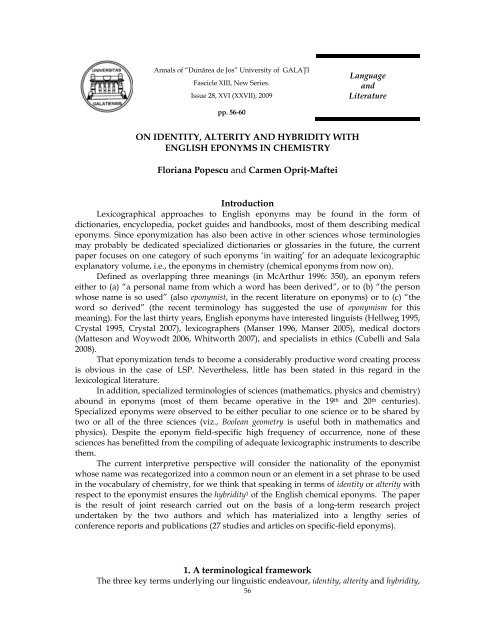Create successful ePaper yourself
Turn your PDF publications into a flip-book with our unique Google optimized e-Paper software.
Annals of “Dunărea <strong>de</strong> <strong>Jos</strong>” University of GALAŢI<br />
Fascicle XIII, New Series.<br />
Issue 28, XVI (XXVII), 2009<br />
pp. 56-60<br />
ON IDENTITY, ALTERITY AND HYBRIDITY WITH<br />
ENGLISH EPONYMS IN CHEMISTRY<br />
Floriana Popescu and Carmen Opriţ-Maftei<br />
Language<br />
and<br />
Literature<br />
Introduction<br />
Lexicographical approaches to English eponyms may be found in the form of<br />
dictionaries, encyclopedia, pocket gui<strong>de</strong>s and handbooks, most of them <strong>de</strong>scribing medical<br />
eponyms. Since eponymization has also been active in other sciences whose terminologies<br />
may probably be <strong>de</strong>dicated specialized dictionaries or glossaries in the future, the current<br />
paper focuses on one category of such eponyms ‘in waiting’ for an a<strong>de</strong>quate lexicographic<br />
explanatory volume, i.e., the eponyms in chemistry (chemical eponyms from now on).<br />
Defined as overlapping three meanings (in McArthur 1996: 350), an eponym refers<br />
either to (a) “a personal name from which a word has been <strong>de</strong>rived”, or to (b) “the person<br />
whose name is so used” (also eponymist, in the recent literature on eponyms) or to (c) “the<br />
word so <strong>de</strong>rived” (the recent terminology has suggested the use of eponymism for this<br />
meaning). For the last thirty years, English eponyms have interested linguists (Hellweg 1995,<br />
Crystal 1995, Crystal 2007), lexicographers (Manser 1996, Manser 2005), medical doctors<br />
(Matteson and Woywodt 2006, Whitworth 2007), and specialists in ethics (Cubelli and Sala<br />
2008).<br />
That eponymization tends to become a consi<strong>de</strong>rably productive word creating process<br />
is obvious in the case of LSP. Nevertheless, little has been stated in this regard in the<br />
lexicological literature.<br />
In addition, specialized terminologies of sciences (mathematics, physics and chemistry)<br />
abound in eponyms (most of them became operative in the 19 th and 20 th centuries).<br />
Specialized eponyms were observed to be either peculiar to one science or to be shared by<br />
two or all of the three sciences (viz., Boolean geometry is useful both in mathematics and<br />
physics). Despite the eponym field-specific high frequency of occurrence, none of these<br />
sciences has benefitted from the compiling of a<strong>de</strong>quate lexicographic instruments to <strong>de</strong>scribe<br />
them.<br />
The current interpretive perspective will consi<strong>de</strong>r the nationality of the eponymist<br />
whose name was recategorized into a common noun or an element in a set phrase to be used<br />
in the vocabulary of chemistry, for we think that speaking in terms of i<strong>de</strong>ntity or alterity with<br />
respect to the eponymist ensures the hybridity 1 of the English chemical eponyms. The paper<br />
is the result of joint research carried out on the basis of a long-term research project<br />
un<strong>de</strong>rtaken by the two authors and which has materialized into a lengthy series of<br />
conference reports and publications (27 studies and articles on specific-field eponyms).<br />
1. A terminological framework<br />
The three key terms un<strong>de</strong>rlying our linguistic en<strong>de</strong>avour, i<strong>de</strong>ntity, alterity and hybridity,<br />
56












